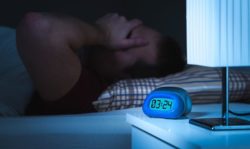 For the first time an online support programme to improve sleep is being offered free from today to over two million adults living in Berkshire, Buckinghamshire, Oxfordshire and Milton Keynes.
For the first time an online support programme to improve sleep is being offered free from today to over two million adults living in Berkshire, Buckinghamshire, Oxfordshire and Milton Keynes.
Sleepio, a web-based programme based on cognitive behavioural therapy, is a proven alternative to sleeping pills. It is now available to all over-18s in the three counties as part of a unique partnership between the NHS, employers and Big Health, the company behind Sleepio.
It is the first NHS rollout of direct-access digital medicine – fully automated, self-help programmes, easily accessible via app or web. The project is funded by Innovate UK and led by the Oxford Academic Health Science Network.
-
Sign-up for Sleepio here: www.sleepio.com/nhs
-
Read more about the Oxford AHSN Sleepio project here: bit.ly/sleepAHSN
Chronic sleeplessness affects between one in five and one in ten adults of working age. In the Thames Valley almost half a million prescriptions relating to poor sleep are issued every year at a cost to the NHS of over £1.5 million.
A major study led by the University of Oxford and published in the JAMA Psychiatry journal in September 2018 found Sleepio led to improved sleep and, importantly, the knock-on health benefits. It also showed that Sleepio could be effective across a large population. The roll-out led by the Oxford AHSN covers a population of over two million adults.
Colin Espie, Oxford University Professor of Sleep Medicine and Chief Medical Officer of Big Health, said: “Most people who seek help with insomnia do so because of its negative impact on their daytime quality of life. This new form of ‘digital medicine’ could be a powerful way to help millions of people not just sleep better, but achieve better mental and physical well-being as a result.
Dr Michael Mulholland, a GP in Buckinghamshire and Clinical Lead for this project, said: “I see the impact of insomnia on people’s lives every day. Sleepio offers a real opportunity to transform lives for the better and to reduce reliance on sleeping tablets. This collaboration will explore the potential of digital innovations to improve lives.”
Douglas Findlay, who lives in Reading, used Sleepio after years of poor sleep. He said: “At first I was sceptical about a web-based treatment. But I discovered Sleepio is really user-friendly and has lots of practical advice – like locking your worries away until the next day. It’s easily accessible and you can use it when you need it. It tracks your sleep, making it easy to see the improvement – and my sleep really did improve. It’s a valid alternative to face-to-face contact and could result in big benefits for a large population.”
Sleepio works by helping people to resolve persistent sleep problems by discovering their ideal personal sleep pattern, and by overcoming the ‘racing mind’ that so often prevents sleep. Clinical trials have shown that Sleepio helps three quarters of insomnia sufferers achieve normal sleep.
The JAMA Psychiatry study published in September 2018 demonstrated the link between better sleep and improved overall health. The 12-month UK study involving over 1,700 users showed that Sleepio improved overall wellbeing, mental health and quality of life.
The Thames Valley Sleepio project is a one-year pilot led by the Oxford AHSN which aims to find the best ways to help people access digital medicine through partnering with stakeholders such as GPs, pharmacies, libraries and employers. It will develop a blueprint for wider uptake of digital medicine across the NHS in England in a bid to improve sleep health and reduce reliance on medication.
Clinical guidelines recommend the psychological approach known as cognitive behavioural therapy (CBT) for insomnia. However, treatment is currently dominated by medication, which can have unpleasant or harmful side effects. Last year, over 12 million prescriptions for insomnia were written, at a cost to the NHS of £72m – that works out as one prescription for every GP, every day of the year.

